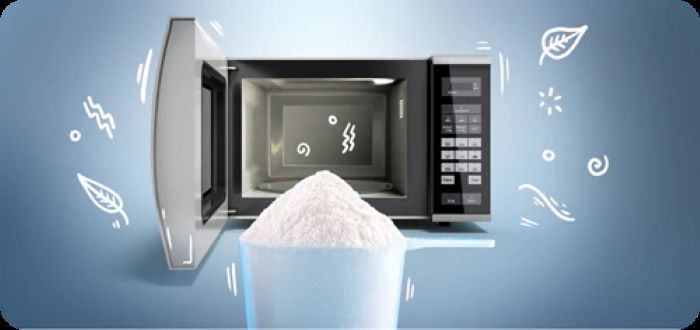Protein powder is a versatile staple for smoothies, baking, and more, but can you microwave it? As a nutrition coach, I’ve answered this for clients curious about heating their shakes or recipes. The short answer is yes, you can microwave protein powder, but there are key considerations to ensure it stays tasty and nutritious. This guide explores the effects of microwaving protein powder, its benefits and downsides, and practical tips, backed by 2025 scientific data.
Understanding Protein Powder and Heat
Protein powder, derived from whey, casein, egg, or plant-based sources like pea or soy, is rich in amino acids for muscle repair, satiety, and overall health. However, heat can alter its structure, raising questions about safety and nutrition.
- What happens when heated? Heat can denature proteins, meaning their molecular structure unfolds. Denaturation occurs naturally during digestion, so it doesn’t reduce nutritional value, per a 2023 Journal of Food Science study. However, high temperatures (>80°C/176°F) may degrade certain amino acids or flavor compounds, affecting taste and texture.
- Microwave specifics: Microwaves heat unevenly, potentially causing hot spots that clump or scorch protein powder, especially in thick mixtures like oatmeal.
Why it matters: Proper heating techniques preserve protein powder’s quality, making it a practical addition to warm recipes or drinks.
Can You Microwave Protein Powder?
Yes, you can microwave protein powder, but moderation and technique are key to avoid clumping, flavor loss, or nutrient degradation. Here’s what you need to know:
- Denaturation is normal: Microwaving denatures proteins, but this doesn’t reduce their nutritional value, as amino acids remain bioavailable. Extreme heat (>140°C/284°F) is rare in microwaves and not a concern for typical use.
- Texture and taste risks: Heat can cause clumping (due to moisture) or a “cooked” flavor, especially with plant-based powders like pea or soy, which are less heat-stable than whey.
- No toxins: Claims about microwaving introducing toxins are unfounded at standard temperatures, per 2025 food safety reviews.
Science check: A 2023 Journal of Food Science study confirms that moderate heating (e.g., 60–80°C/140–176°F) in microwaves doesn’t significantly degrade protein quality, though flavor compounds may diminish.
Benefits of Microwaving Protein Powder
Microwaving protein powder can enhance its usability:
- Easier mixing: Warm liquids dissolve powder more smoothly, reducing lumps.
- Improved palatability: A warm shake or dish (e.g., oatmeal) can be more comforting, especially in colder months.
- Digestibility: Slight denaturation may make amino acids more accessible, though the effect is minimal (Journal of Dairy Science).
- Versatility: Adds protein to warm recipes like mug cakes or soups without compromising nutrition.
Downsides of Microwaving Protein Powder
Potential drawbacks include:
- Clumping: Heat and moisture can cause protein to clump, creating a gritty texture.
- Flavor changes: High heat may dull sweetness or create a “cooked” taste, especially in flavored powders.
- Nutrient loss (minimal): Extreme overheating (>140°C) could degrade sensitive amino acids like lysine, but this is unlikely in standard microwave use.
- Heat sensitivity: Plant-based proteins (e.g., pea, soy) are less stable than whey or casein, risking texture issues.
Tip: Add protein powder after microwaving to minimize clumping and flavor changes.
How to Microwave Protein Powder Safely
To microwave protein powder without compromising quality:
- Add post-heating: Heat your liquid (e.g., water, milk) or base (e.g., oatmeal) first, then stir in protein powder to avoid direct heat exposure.
- Use low power: Microwave on 50% power for 20–30 seconds to prevent overheating.
- Stir thoroughly: Use a whisk or frother to ensure smooth blending and prevent clumps.
- Choose heat-stable powders: Whey protein concentrate or casein are best; avoid pea or soy for microwaving.
- Monitor temperature: Keep liquids below 80°C/176°F to preserve flavor and texture.
Example: For a warm protein shake, microwave 1 cup of almond milk for 20 seconds on low, then blend in 1 scoop of whey protein (~20–25 g protein, ~120 calories).
Best Protein Powders for Heating
Not all protein powders handle heat equally. Here’s a breakdown:
- Whey Protein Concentrate (~120 calories, 20–25 g protein per scoop)
- Why: Heat-stable, neutral flavor, blends well in warm recipes.
- Best for: Oatmeal, mug cakes, warm shakes.
- Casein Protein (~110 calories, 20–24 g protein per scoop)
- Why: Thickens when heated, ideal for dense baked goods.
- Best for: Protein pancakes, custards.
- Egg White Protein (~100 calories, 20 g protein per scoop)
- Why: Light texture, high heat stability, no cholesterol.
- Best for: Baking, soufflés.
- Plant-Based Proteins (Pea, Soy, Hemp) (~120–150 calories, 15–20 g protein per scoop)
- Why: Less heat-stable, earthy taste may overpower recipes.
- Best for: Cold or lightly warmed recipes, not microwaving.
Note: Avoid whey protein isolates for baking, as they can become dry or grainy when heated.
Can You Microwave Protein Shakes?
Yes, you can microwave protein shakes, but follow these tips:
- Heat liquid first: Warm milk or water, then add powder to avoid clumping.
- Use heat-stable proteins: Whey or casein over plant-based options.
- Keep it brief: Microwave for 15–30 seconds on low to avoid overheating.
- Stir well: Blend thoroughly to maintain smoothness.
Can You Bake with Protein Powder?
Yes, protein powder is great for baking, especially whey concentrate and casein:
- Whey Concentrate: Neutral flavor, blends well in muffins or cookies (~20 g protein per scoop).
- Casein: Creates dense textures, ideal for cakes or breads.
- Egg White Protein: Adds lightness to baked goods, perfect for pancakes.
- Avoid: Plant-based proteins (pea, soy) due to strong flavors and poor heat stability.
Tip: Replace ¼–½ of flour with protein powder in recipes, and add extra liquid to prevent dryness.
Comparison Table: Protein Powders for Heating
| Protein Type | Calories (per Scoop) | Protein (g) | Heat Stability | Best Uses |
|---|---|---|---|---|
| Whey Concentrate | 120–150 | 20–25 | High | Shakes, oatmeal, baking |
| Casein | 110–130 | 20–24 | High | Baking, thick shakes, custards |
| Egg White Protein | 100–120 | 20 | High | Baking, pancakes, soufflés |
| Pea/Soy (Plant-Based) | 120–150 | 15–20 | Low | Cold smoothies, minimal heating |
FAQs
Can you microwave protein powder in oats?
Yes, but add powder after heating oats to avoid clumping. Stir thoroughly for smooth texture. Microwave on low for 20–30 seconds.
Does heat destroy whey protein?
No, heat denatures whey protein but doesn’t destroy its nutritional value. Amino acids remain bioavailable unless heated above 140°C/284°F.
Can you add protein powder to coffee?
Yes, blend powder into hot or iced coffee using a frother or blender to prevent clumping. Whey concentrate works best for flavor.
Is it safe to microwave protein shakes?
Yes, if you heat the liquid first and add powder afterward. Use low power and stir well to maintain texture and taste.
What happens if you overheat protein powder?
Overheating (>80°C/176°F) can cause clumping, flavor loss, or minor amino acid degradation, but nutritional value remains largely intact.
Why Microwaving Protein Powder Can Work
Microwaving protein powder is safe and practical when done correctly, offering convenience and versatility for warm shakes or recipes. It doesn’t significantly reduce nutritional value, but proper technique (e.g., adding powder post-heating) ensures optimal texture and flavor. Whey and casein are the best choices for heating, while plant-based powders are better for cold uses.
Why it matters: With mindful preparation, you can enjoy warm protein dishes without compromising nutrition, fitting seamlessly into a busy lifestyle.
Who Should Microwave Protein Powder?
- Busy individuals: Seeking quick, warm protein options.
- Flavor enthusiasts: Wanting cozy shakes or baked goods.
- Dieters: Adding protein to low-calorie recipes for satiety.
- Cooks: Experimenting with high-protein baking.
Caution: Avoid overheating plant-based powders, and check for allergies (e.g., whey, soy). Consult a dietitian for personalized advice.




